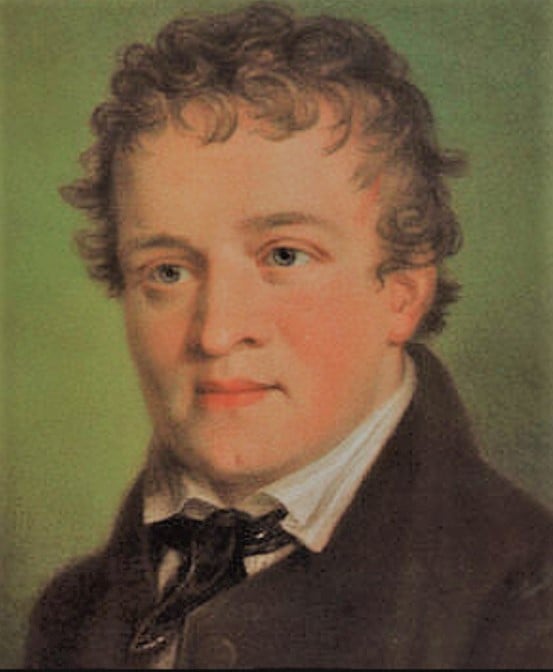
A feral child is an individual who has lived isolated from human contact from a very young age, with little or no experience of human care, social behavior, or language.
Besides children being raised in the “natural state” provided by the wild, there are also many cases of children who were raised or kept in extreme isolation. A famous story is that of Kaspar Hauser, told in Wolf-children and Feral Man by Singh and Zingg.
Kaspar gets discovered
Kaspar was first discovered on May 26, 1828, standing unsteadily in a square in Nuremberg, dressed in clumsy clothing. In his hand, he held letters directed to the Captain of the 4th Esgataron of the Shwolishay regiment, which, among other things, instructed the captain that “…if he isn’t good for anything [the captain] must either kill him or hang him in the chimney.”
The boy was about sixteen years of age, appeared unable to communicate, and his eyes were red and unused to sunlight. He did not know how to use his fingers, and the soles of his feet, blistered from walking, were as smooth as a baby’s hands. He walked by placing both the ball and heel of the foot down at the same time. Like a child newly emerged from the womb, this adolescent boy seemed a complete stranger to almost everything in the world.
A complete stranger
At first, regarded as a vagabond and halfwit, he was taken to a prison cell where he was kept while the authorities tried to figure out what to make of him. He could utter only a few phrases, clearly meaningless to him, such as, “I want to be a rider like my father” and “Don’t know,” which he used to express everything from thirst to anxiety. When handed paper and pen, he wrote “Kaspar Hauser.”
Kaspar could not eat anything but bread and water and reacted violently to most sensory impressions. The very smell of meat or alcohol would put him into terrible convulsions. When presented with coffee, he would sweat and vomit. At night, he lay on his straw bed; during the day, he sat on the floor with his feet before him. When a mirror was shown to him, he looked behind him as if to find the person seen in the mirror.
Kaspar gets educated
Hauser’s keeper, Herr Hiltel, took Kaspar to his home, where Hiltel’s son, Julius, was permitted to play with Kaspar. It was also Julius, writes Hiltel, who taught Kaspar to speak. Kaspar was also of interest to the mayor, Bürgermeister Binder, who brought Kaspar to his house for conversation most days, and to a certain Professor Daumer, a teacher who was to devote his time to the boy’s education.
The visits with the mayor led to a more or less coherent study of Kaspar’s whereabouts since birth. During their conversations, Herr Binder, who believed that he had communicated well enough with Kaspar, attempted to reconstruct Kaspar’s former life. Some people doubted Herr Binder’s recollection. They did not think Kaspar’s speech was advanced enough for him to provide a coherent story at that time.
Nevertheless, what Kaspar said, according to Herr Binder, was that he had lived upon bread and water in a small, dark cell. He had known only one person, alluded to by him as “the man,” who periodically drugged him to clean him, change his clothes, cut his fingernails and hair, and once hit him for being noisy. He was kept alive in this near vegetative state until his keeper appeared toward the end of his confinement, taught him to write Kaspar Hauser (he did not know the meaning), walk, and speak a few rudimentary sentences. Equipped with only these and a rough collection of clothes, Kaspar had been led to the Nuremberg market and abandoned there.
Two months after being discovered, Kaspar went to live with Daumer, where he was provided with round-the-clock education. He flowered under Daumer’s gentle and compassionate tutelage and learned to read, write, and even play chess.
Not a happy ending
The end of the story is not happy, though. Kaspar died on December 17, 1833, three days after a second attempt had been made on his life. Numerous conflicting explanations have been offered for Kaspar’s murder. The most prevalent theory is that Kaspar Hauser was originally locked away because he stood in the way of possible succession to the state of Baden. When the result was obtained, Kaspar was released, so goes the story, with the letters he carried with him being written to mask the true reason. However, fear that he would eventually expose his perpetrators required his permanent removal.
The epitaph on Kaspar’s tombstone in Ansbach, Germany, pretty much sums up his strange, short life: “Here lies Kaspar Hauser, enigma of his time … mysterious his death.”.



